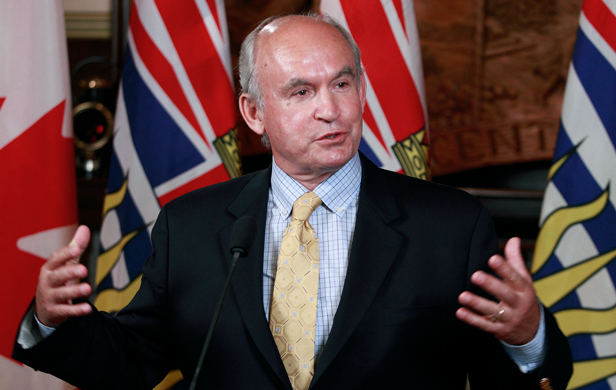
The Honorable Bill Bennett;
Re: BC Hydro
It was event in 2009 that the financial direction taken by the BC Hydro Board, under the direction of the Cabinet, was a serious misread on the global and provincial economic circumstances and outlook. Far too much was expected when all the credible evidence indicated a global slow down was in the making. Nothing much has changed since then but BC Hydro has carried on with the narrative that growth and “good times” are just around the corner.
Starting in 2006, fueled by the fraudulent activity of Enron, BC has been on the well trodden path of others who believed the export of electricity, particularly “green energy”, was the road to financial salvation for BC. This was a theme from the 70s and coal was the fuel. Natural gas is the current narrative.In every case taxpayers were committed to debt that became “stranded” – of no economic value.
Since 2006/09 domestic (BC only) demand has mostly “flat-lined” at about 50,000 GWhrs making liars out of the many at Hydro and elsewhere who, a decade ago, forecasted demand to be well over 60,000 GWhrs per year by 2012. The record is replete with similar examples of demand exaggerations from BC Hydro.
Using the narrative of “need” being an absolutely ridiculously high number the government engineered a serious gross generation surplus that came at a cost of more than $50 billion in new contractual debt, from which the citizens of BC earn no equity after paying for the cost to build these sites. Surplus generation capacity is a luxury that comes at a very high cost, much like any excessively large insurance policy.
That is now all history. What is needed now is rational action. Collapsing contracts, while instinctively appealing, is hardly the solution.
Raising BC customer rates to get BC Hydro into a cash break even condition is politically dynamite. An across the board rate increase of 35-40% would be what is needed if all else is left to run its course.
Far better would be to transfer IPP contracts, with their ongoing payment obligations, from Hydro to the Government. A total that represents a production value of 15,000 GWhrs per year would be a good target amount. These would then be categorized as an “industrial development” component, not truly the responsibility of existing Hydro ratepayers, but rightly the responsibility of all the citizens of BC.
As to Site C and other new projects, the cost of electricity from these IPPs is north of $100/megawatt hour but large industrial users in BC expect to pay $40 or less. The contradiction is that large industrial customers in BC expect to pay $40 or less. In most other places in the world LNG plants use their own commodity to generate electricity for liquefaction purposes. Why we in BC would use high cost new electricity to do this job is hard to fathom as it would represent a huge subsidy from Hydro ratepayers for a trivial amount of employment.
Sincerely
Erik Andersen; Economist


Here we are at the beginning of 2019 and we are worse off than I imagined we would be back in2013.
We know from the Auditor General’s report of Feb. 2017 that the “contractual Obligations” of BC Hydro, and by extension all BC citizens, is over $100 billion.
We know from the BC Hydro report titled “Forecast of Demand”, dated 2015, that the inputs for future population and GDP values were provided by specified independent consultants. The annual increases in future for residential and commercial were exaggerated by a least double. These exaggerations were deliberate and did not make any provision for the curbing of demand by higher prices. After a 25% roll-back in sales to large industrial customers the so called forecast called for annual increases of + 6%, right at the time the value added industrial sector was leaving the province for off-shore locations.
We also know that no asset value is being earned by the citizens of BC in-spite of the fact that all secret IPP contracts include sufficient payment to retire the IPP borrowings.
And lastly we know that all BC mines were offered a BC Hydro payment holiday starting in 2015 that was estimated to be worth millions per month. Despite this subsidy being paid for by other ratepayers no evidence has been offered as to how much is the total of these receivables. These means something now that we know Prosperity Mines is closing operations for lack of profitability.
It is perfect time to make some plans for the longer term and it is time to be
happy. I’ve read this submit and if I may I wish to counsel you few
attention-grabbing issues or tips. Perhaps you can write subsequent articles referring to this article.
I desire to read even more things about it!
Wednesday, 03 July 2013 11:09 posted by scotty on denman
Nationalization was held up for ridicule by Mike de Gong during the election, “…haven’t heard that word since Cuba”, he said, ridicule that might have got lost in the comic-tragedy penned by the NDP themselves. He was referring to a “leaked” NDP brainstorming document which included a discussion point for nationalizing IPPs, those being a vulnerability that de Gong was highly sensitive to at a point when the BCLs still feared losing the election. BC Hydro is, of course, already nationalized but the fact de Gong forewent an opportunity to employ sarcasm and irony shows the BCLs would that it wasn’t so. Kinda like most people mistake BC Ferries as privatized.
Tom Fletcher of Black Press refers to the same document, ripping into the NDP for daring to suggest we get rid of P3s, as if they’re so fundamentally customary that such a notion is flat-out crazy (Public-Private-Partnerships are a recent phenomenon and make up only a small fraction of government expenditure). Again the device is ridicule but Fletcher uses the wave of derision over the NDP’s camapaign-losing pusillanimity to confuse the fact that IPPs and P3s hurt the public so badly, it’s nothing to laugh at. Joke’s on BC.
Wednesday, 03 July 2013 00:52 posted by Kevin Logan
What are your thoughts about the Transmission line cost overruns revealed after the election reaching near 1 billion dollars on a project originally estimated to cost BC Hydro 175 million dollars, ensuring massive upward pressure on rate payers, not only in the North but everywhere.
Not to mention that one of the companies involved and benefiting from the transmission line is the IPP with the longest, and therefor most rich “contractual obligation” to overcharge hydro for the power it generates for 60 years into the future!
This cost overrun makes the BC Ferries look like bathtub boats, was not disclosed until after the election and has hardly been reported on, but the “BC Bombing” is a 24 hour news story. One which is highly dubious and looking more and more like a gong show of extraordinary portions for our part of the world.
We are in a lot of trouble. And, although this is near impossible to conceive, its only just begun.
All of this is contributing to the inevitable destruction of a model public asset, which is now simply been reduced to a vessel to offload private sector “externalities’ before they gobble it up for themselves, leaving BC with the debt and them the revenue
Tuesday, 02 July 2013 12:17 posted by scotty on denman
Mr Andersen’s question is rhetorical, that is, it is meant to convince that the BC Liberal LNG policy (building Site C to compress NG) is stupid. He has more straightforwardly accused the government of trying to intentionally bankrupt BC Hydro. The list of proofs is more convincing than the rhetoric and IPPs are right at the top.